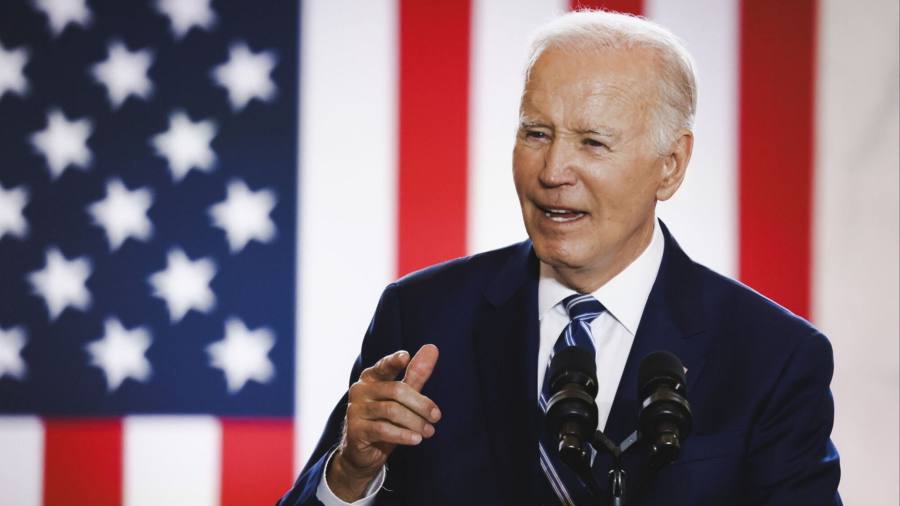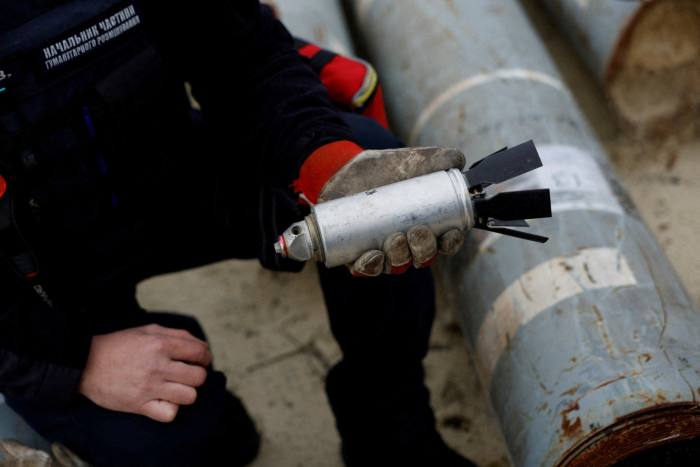
Receive free War in Ukraine updates
We’ll send you a myFT Daily Digest email rounding up the latest War in Ukraine news every morning.
The US will supply Ukraine with cluster munitions for the first time after President Joe Biden approved the move as part of a new military aid package, US officials familiar with the decision said on Friday.
The move to send cluster munitions, which are banned by many countries, comes as Washington and western allies try to boost Ukraine’s counteroffensive and help its forces regain occupied Russian territory. The package is set to be announced ahead of next week’s Nato summit in Lithuania.
Both Russia and Ukraine have already been using the munitions in the conflict after retaining Soviet-era stockpiles, but Moscow has used them to especially devastating effect, including against civilian targets. The Ukrainian military has deployed them mainly to clear Russian defences.
The US weapons will be the first time Kyiv has received cluster munitions from a western partner. The White House and the Pentagon declined to comment.
Ukraine is pushing for its western partners to replenish its dwindling stores of cluster munitions as its counteroffensive takes shape. Military and political leaders argue the munitions would help its troops clear Russia’s mazes of trenches, providing a greater opportunity for a breakthrough.
Cluster munitions are weapons that break apart in the air and spread smaller bomblets across an area the size of a football pitch. They are often fired from artillery but can also be dropped from the air.
The bomblets are designed to explode on impact, spraying high-velocity pieces of shrapnel. But a high percentage of the submunitions — between 10 per cent and 40 per cent, according to the International Committee of the Red Cross — often fail to detonate, effectively turning them into landmines that can pose a threat for years after their initial use.
This has made them a highly contentious form of weaponry, which the United Nations has called for both Russia and Ukraine to avoid using.
Mykola Bielieskov, research fellow at the National Institute for Strategic Studies, a Ukrainian-government think-tank, said the munitions allow Ukraine’s forces to “effectively” target “manpower and weaponry”.
“We can lure Russians to take open positions, anticipating our attacks, and then target them with cluster munitions,” he said.
Human rights groups criticised the US decision to provide the munitions, pointing out that they pose significant risks to civilians long after wars end.

“If the goal is a free Ukraine, where kids can grow up in safety and security, then using cluster munitions is not the way to get there,” said Andrew Stroehlein, European media and editorial director at Human Rights Watch.
Mykhailo Podolyak, a senior adviser to President Volodymyr Zelenskyy, lashed out at HRW, accusing it of sympathising with Moscow.
“What is this, a joke? A prank? Has the invasion of Russian agents in various global ‘offices’ finally destroyed moral imperatives?” he tweeted.
“Weapons, more weapons, and more weapons, including cluster munitions. And no talk in favour of ‘Russian plans and concerns’,” he added.
Michael Kofman, a senior fellow at the Carnegie Endowment, said that for Ukraine’s counteroffensive, artillery ammunition was “like sand in an hourglass”. Releasing cluster bombs “will eliminate much of the time pressure by opening up a large tranche of ammunition to keep the offensive going”, Kofman said, adding that receiving this type of weaponry was “far more significant” than other recently acquired western arms.
One advantage of cluster munitions is that the US has large supplies it can quickly tap into, with nearly 3m rounds in its inventories, much of them in US and allied bases in Europe.
Jens Stoltenberg, Nato’s secretary-general, said that while Nato had no formal position on cluster munitions, all allies supported providing weapons to Ukraine and it was up to each one to decide which types.
“When it comes to cluster ammunitions, there are differences among allies,” Stoltenberg said. “It is for these individual allies to make these decisions. Nato as an alliance does not have a position.”
Additional reporting by John Paul Rathbone in London